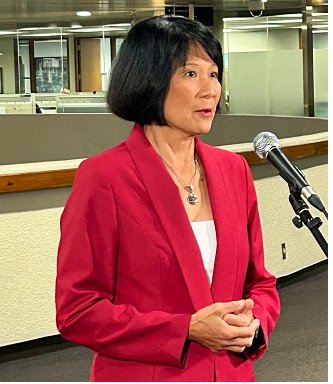Olivia Chow’s project: twenty-five thousand houses at affordable rent
TORONTO – Twenty-five thousand “affordable” homes: this is one of the priorities of the new mayor of Toronto, Olivia Chow (in the pic above, from Twitter – @MayorOliviaChow), who today presented what she called a “first step” in her attempt to build, indeed, 25,000 homes to rent at more affordable prices, in addition to those already planned for the city.
The City Executive Committee approved Chow’s motion, which brings together various agencies and companies to develop a new plan to build public and community housing. The motion says Toronto is facing an “unprecedented housing crisis” and that building more homes is the mayor’s “top priority”. The plan calls for the construction of 7,500 affordable homes – of which 2,500 would be new income-oriented rental units – and another 17,500 rent-controlled homes.
In addition, the motion, which will be considered by the City Council early next month, asks City staff to report back by the end of the year on their efforts to align City resources and find suitable plots of land for those projects.
This represents an important milestone for Chow who has based a large part of her electoral campaign on the promise to bring the city back to building social housing, instead of leaving it exclusively to the private sector.
Another knot to be resolved urgently is that of public transport, the growth of which could still be a long way off. “Overall passenger numbers on public transport continue to rise – they currently stand at around 76% of our pre-pandemic levels – but the number of regular passengers, i.e. commuters, is still at 56% of our pre-pandemic level” City director Paul Johnson told the Executive Committee today. And fewer passengers are one of the major “drain” factors on the City’s operating budget.
The Executive Committee is evaluating a number of new revenue options, including a council sales tax, a parking levy and various increases in existing taxes such as the vacancy tax and the land transfer tax on homes luxury.
However, City officials have warned that none of the contemplated tax instruments will be enough to cover everything, underlining the need for urgent help from other levels of government. Which, moreover, as is known, have already answered “not”. With the risk that the necessary money – a lot – will be taken exclusively from the pockets of Torontonians.




